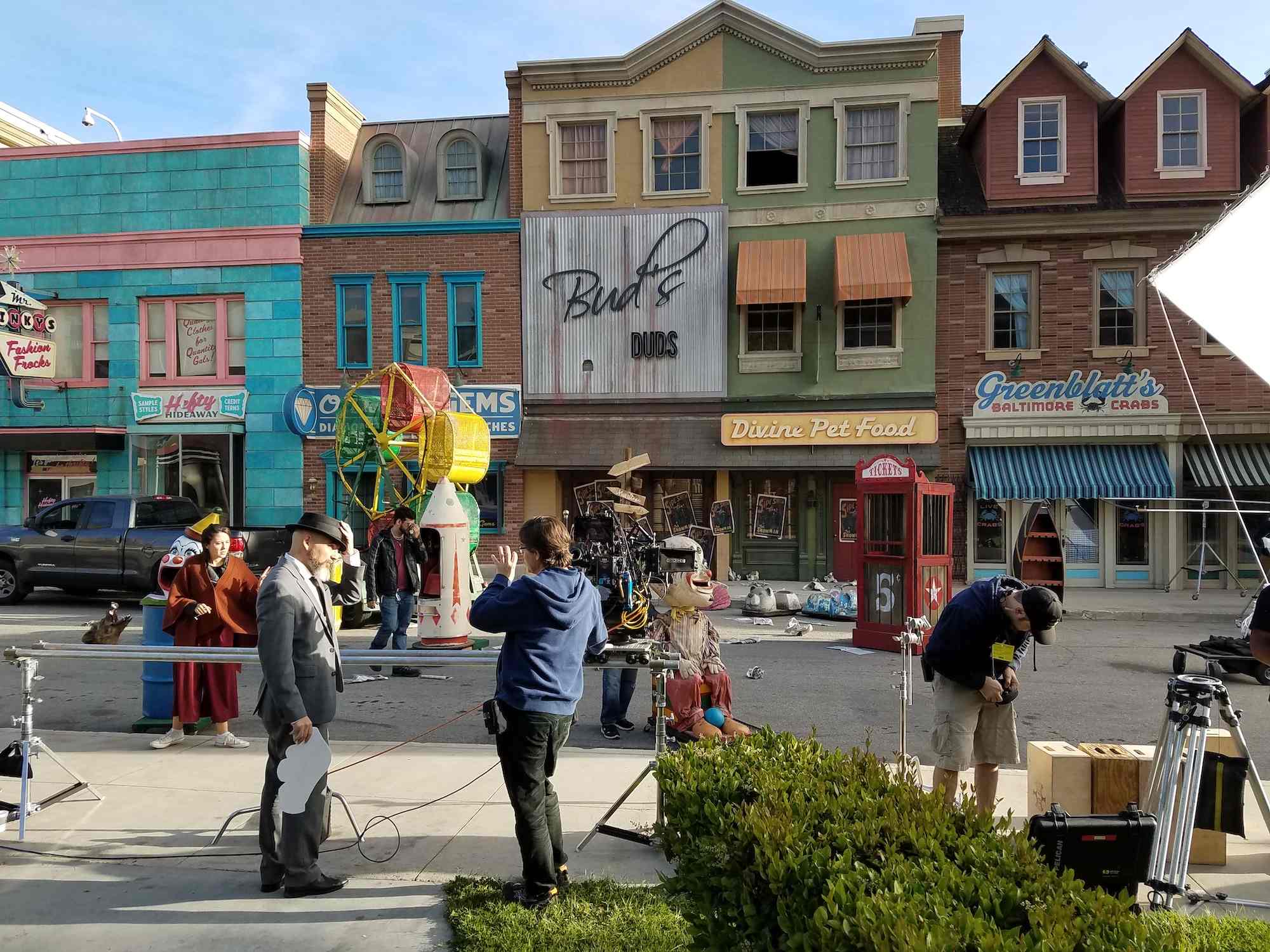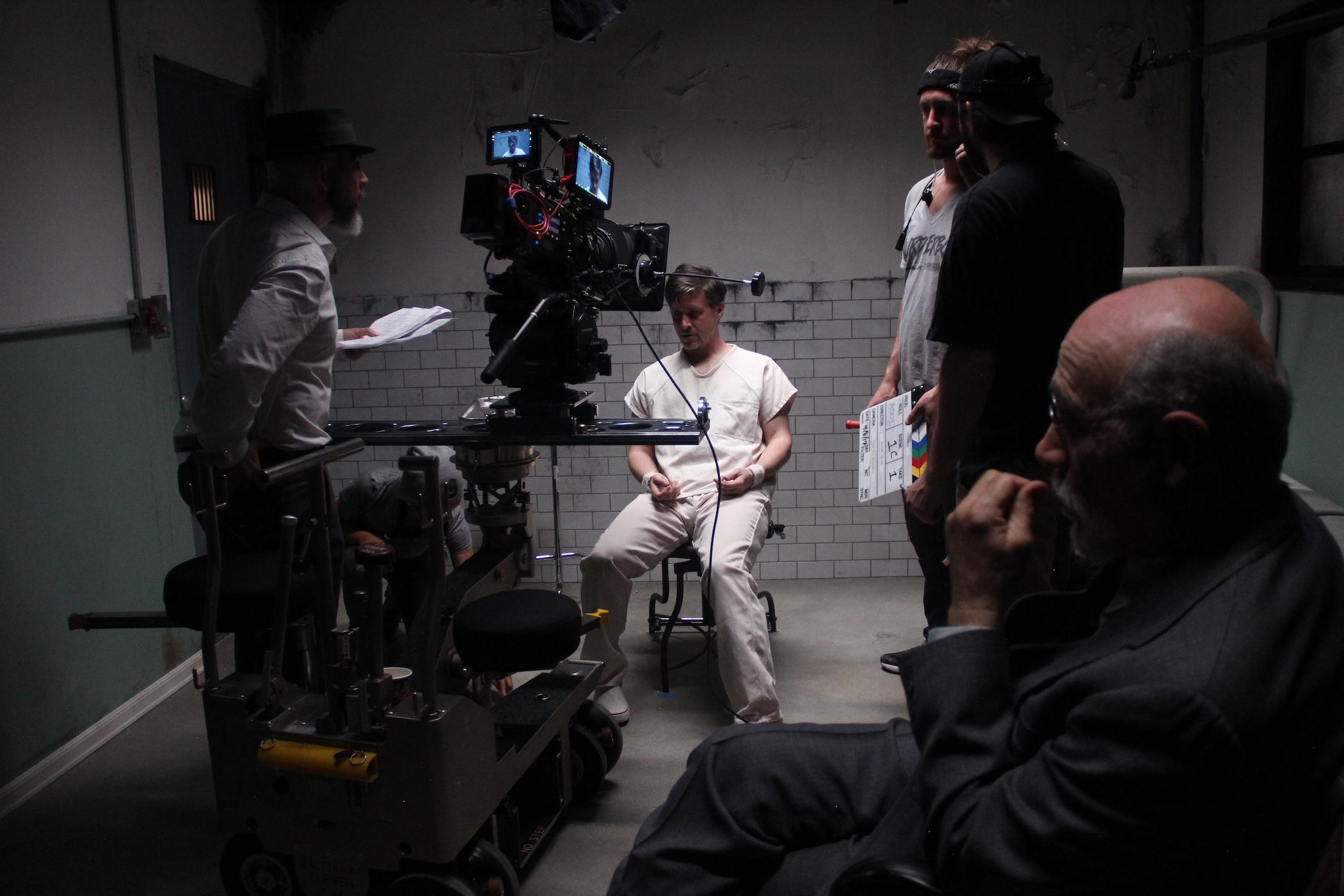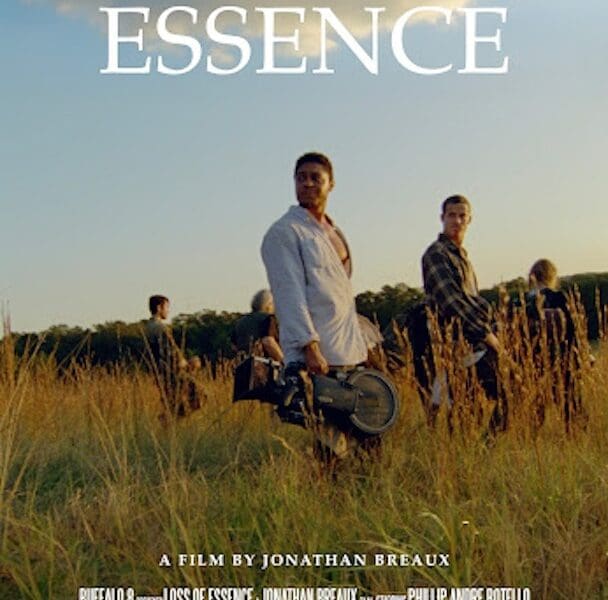
Get to know ‘In a Foreign Town’ filmmaker Michael Shlain
Michael Shlain finds artistry in every aspect of life. The agent-turned-filmmaker has directed a wide range of narrative, branded and commercial content for clients including Twitch, Nat Geo Wild, and BBC America.
Shlain is also the co-founder of Butcher Bird Studios, which is a production company based out of Los Angeles. The company prioritizes unique concepts, and has helped launch groundbreaking content like the interactive sci-fi drama Orbital Redux and the zombie film Better Off Zed.
Shlain is currently working on a TV anthology series based on his film In a Foreign Town. The series pulls from the works of horror writer Thomas Ligotti, and tackles such grisly themes as isolation and fate. You can watch the In a Foreign Town film right now on Film Shortage or the film’s official site.
Film Daily was lucky enough to chat with Michael Shlain about his production company, his varied past, and his vision for the upcoming TV series. Here’s what he had to say:

Tell us about your history in filmmaking. How did you start your journey?
My journey started, as they often do, with my parents. When I was 7 years old, my father brought home one of the first commercial VHS camcorders on the market. E.T. The Extra-Terrestrial had just come out and I remember my mother telling me a story about how Spielberg got started making Super-8 films as a kid. Those two things opened up the realm of possibility and I started making my own live action and stop-motion films. Dad was my first DP.
The closest thing I had to a formal film education was a summer film program at the Maine Media Workshops. The program was focused on teaching real-world technical knowledge: Budgeting, Scheduling and the essentials of physical production– from rolling cable to operating a camera. After the first week they had us shooting 16mm commercials and crewing for each other. It was a pivotal experience that created a foundation for what came after.
In my last two years of college (at Tufts University) I started a student film production company. We pulled together resources from the University as well as the local Boston film community and produced two fairly ambitious 16mm shorts during that time. It was through this experience that I met Steven Calcote, one of my business partners at Butcher Bird Studios.
You worked as an agent prior to becoming a filmmaker. Did you learn any skills as an agent that have been useful in your current career?
Working as an agent taught me a great appreciation for contracts and the process of negotiating agreements. I had previously held (what is probably a popular notion) that such activities were a bearable, but necessary evil, though altogether separate and somehow antithetical to the activities of “creativity.” What I know now is that all these “dry” elements of contracts, budgets, schedules, union rules, bank accounts, cash flows– all these agreements between people are the framework and container for creativity and what makes creation possible.
When people see the ceiling of the Sistine Chapel they usually forget that Michelangelo had to construct a scaffold of wood and iron in order to get his artist ass up there in the first place. If the agreements are well crafted, they create space and safety for creativity. When the invisible armature is shaky, the whole project stands in peril of collapse.
You’ve helmed a wide range of narrative, branded and commercial content. Do you find that your duties as a director change depending on the medium you’re working in?
Every project is uniquely different but in every case, my team and I are creating an entire world from scratch each time.
While there are certain technical differences between directing narrative, documentary or a live-streamed show, in every case, my job is to develop a detailed understanding of the story, an image of the final product, and then be responsible for all the interlocking pieces that need to exist to make the image a reality.
I need to have a deep intimacy with all the elements and what their purpose is in order to clearly communicate this to the departments.
You are the co-founder of the production company Butcher Bird Studios. What do you think sets Butcher Bird apart from its peers?
Butcher Bird Studios is led by a team of directors and creative producers with a command of the complete creative workflow. As such, we can provide the services of a creative agency, production company and post-production studio all in one.
Because we design and handle the complete pipeline with our directors at the helm, we can be super efficient, control costs, and (most importantly) make sure all the decisions along the way are serving our client’s story.
Where did the name “Butcher Bird” originate?
“Butcher Bird” is the colloquial name for the shrike, a family of small songbirds which hunt rodents and insects and then impale them on thorns and barbed wire. Beside the obvious badassery, we all thought that the Butcher Bird was a fitting totem because of how it symbolizes our approach to filmmaking.
We’re a relatively small organization that punches above its weight by using cutting-edge technological tools as a force-multiplier.
Butcher Bird recently produced Orbital Redux, which is the first live-streamed, interactive sci-fi drama. What were the biggest challenges in getting such a groundbreaking project made?
For this answer, I would definitely recommend you interview Orbital Redux creator and Butcher Bird partner Steven Calcote. However, in the meantime (and because an image is worth a thousand words) this BTS video will provide a taste of the experience:
Do you think live-interactive technology is going to become a bigger part of the filmmaking process in the future?
Live-streamed interactive is already a big part of the media landscape and it’s only going to grow. Channels like Twitch.tv are entirely dedicated to the format which allows audiences to have a greater degree of connection to both the content and each other. At Butcher Bird, we’re especially interested in the intersection of live-interactive format with traditional narrative genres like sci-fi, horror and comedy.
We recently did a series of live/interactive horror specials for Twitch. Through chat interaction, the audience got to co-create the story in real time. In some ways it was like improv theater or like having a public ‘writer’s room’ that was constantly throwing out suggestions that we would then incorporate.
Butcher Bird also produced the indie film Better Off Zed, which is drastically different in tone. Do you purposely seek out projects that are varied and may connect with different audiences?
At Butcher Bird, our original development is very much driven by the inspiration of our creative partners. Within our team, we are fortunate to have a diversity of interests and stylistic approaches. Better Off Zed was the brainchild of Butcher Bird partner Travis Stevens channeling his personal experiences and questions he was interested in exploring.
Rather than doing market analysis and trying to reverse-engineer a product, we trust that an authentic story already has an audience waiting to be found. We then rally around our creators to find the best way to express that story and find a path to its audience.
How closely do you work with directors when you are producing their projects? Do you offer creative input or do you prefer to let them take the lead creatively?
Virtually all of our projects are directed by our in-house directors who are also part of the producing team. We are a very collaborative group and don’t see leadership and creative input as mutually exclusive. As directors we thrive on asking for and receiving creative feedback from our collaborators. It’s how we cover our blind spots and push our boundaries to become better creators.
You’re currently producing a TV anthology series based on In a Foreign Town. What was the initial inspiration behind the series?
In a Foreign Town is based on the stories of Thomas Ligotti who is one of the most acclaimed horror authors of our time. The anthology series is primarily based on his In a Foreign Town, In a Foreign Land collection but also draws from other stories which feature these surreal nightmarish towns as their setting. The original thought was, what if all these stories are connected? Taking place in the same town– and at the same time?
Structurally, I was inspired by interconnected anthologies like Frank Miller’s Sin City, Edgar Lee Masters’ Spoon River Anthology and Krzysztof Kieślowski’s Decalogue. Because these are individual stories told in parallel, this kind of structure underscored a feeling of isolation and disconnection between the characters, which fit well with Ligotti’s themes.

The series is based on the short stories of author Thomas Ligotti. When did you discover Ligotti’s work? Why do you think it translates so well to the TV screen?
I first met Mr. Ligotti in my previous life as a Literary Agent. I was in charge of shopping his work for feature film and television. We made a number of deals during this time, but nothing ever went into production. When I left representation and transitioned to directing, I reached out to him about adapting his stories into a series. I think what makes Ligotti’s works so effective is also what makes it challenging to adapt.
The stories rely on creating a mood of creeping dread and unease, but the threat is not localized or specific. The fear factor is not Freddy, Jason or the Xenomorph lurking in a dark corner. With Ligotti, it feels as if your whole world is out to get you. That’s a tricky thing to pull off, but we think we figured out how to do it for the series.
What would you say is the biggest difference between the series and the Foreign Town short film you made in 2018?
The series is bigger in scope and entirely takes place in the Town. Each episode follows a different Visitor who is lured to the Town with the promise of fulfilling a different need or desire– whether for power, success or security. Each in turn becomes trapped and swallowed into their own personal nightmare. In the series we’ll get to further explore characters and themes that are only hinted at in the short.
Do you have other Ligotti adaptations in mind for future episodes of the TV anthology series?
We have completed scripts for Season One based on the initial collection of stories. And as for subsequent seasons, to paraphrase Ligotti, “We have a special plan for this world…”
Who are your biggest horror influences?
David Lynch (Muholland Dr. and Erasherhead) for his mastery of surreal nightmarish dread. Clive Barker (Hellraiser) for proving you can get away with showing the monster if the monster is well-designed enough. Roman Polanski (Rosemary’s Baby and Repulsion) for ratcheting slow-burn paranoia and tension.
David Cronenberg (The Fly, Scanners, The Brood) for his visceral body-horror. David Fincher (Se7en, Zodiac) for his maniacal precision, [William] Friedkin and [William Peter] Blatty’s The Exorcist for its chilling understanding of evil, and [Stanley] Kubrick’s The Shining for its psychologically powerful camera technique and use of music.
Have you worked with mentors in the past? How would you recommend people go about finding them?
In the Tao Te Ching, it is written “When the student is ready, the teacher will appear.” I don’t believe those relationships can be directly manufactured, but rather can manifest as a consequence of sincerely pursuing interests.
I’ve been fortunate to have had some significant mentors in my life. One emerged through a college internship, another through enrolling in a writing seminar. As for recommendations, I say follow your nose, be on the lookout for synchronicities, and pursue White Rabbits.

You’ve worked as a writer, producer, and director. Is there a part of filmmaking you want to attempt but haven’t gotten the chance to yet?
Directing was always a big love and I hope to hang out here for a while. That said, I was trained as an actor and miss that experience, so I would love to find a way to flex those muscles again.
What has been your greatest success as a filmmaker?
Right now, I am very excited to finally have IAFT out in the world and finding its audience. It’s been a relatively long journey for a short film and I’m very proud of our team and their work. One of the most satisfying experiences has been connecting to people who have seen the film and hearing their interpretations and personal reactions to some of its open ended mysteries.
I believe that a work of cinema is essentially a channel to create a connection between people, and our success can be measured to the extent that our film manages to do that.
What did you learn from your biggest failure?
Don’t try. I’m kidding… but actually, kinda not. In the past, I think what I would have deemed great “failures” were of the “failure to launch” variety. Unfinished scripts or projects that I couldn’t find financing for.
In many of these cases, I would be extremely hard on myself for not being able to “make it happen” but instead of being motivating, the pressure from trying too hard (and the attendant guilt and shame) would squeeze all joy from the experience. I’ve since come to understand that joy is the lifeblood of creation.
These days, I am committed to both finding the joy in the process and actively protecting it. I’m also aware that every project has its own timing and destiny regardless of the plan that’s in my head. It’s a reminder to relax and treat the creative process like a dance rather than the storming of Normandy beach.
Can you tell us about any upcoming Butcher Bird projects?
Some of the other things we have in the pipeline include: a second season of Orbital Redux, an epic horror western saga, a true crime anthology and a comedy series about a wacky lawyer. Also for current and aspiring outdoor aficionados, I highly recommend checking out the G.O. Get Outside podcast, created by Butcher Bird partner Jason Milligan.
What advice do you have for aspiring filmmakers?
Read Why Greatness Cannot be Planned: The Myth of the Objective by Kenneth Stanley and Joel Lehman. Recognize the limitations of linear planning when it comes to creating something original– whether it’s a screenplay or a career– and instead trust and follow curiosity.
Read Never Split the Difference by Chris Voss. An excellent manual on negotiation written by a former hostage negotiator. Be in touch with your true needs and learn how to ask for them.
Finally, read How I Made a Hundred Movies in Hollywood and Never Lost A Dime by Roger Corman. Learn from one of the original masters of independent cinema who created a legacy by cleverly embracing limitations.







